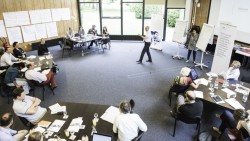New IPAT coordinated course on Effective Advising in Complex and Fragile Situations
For decades, ‘technical cooperation’ to strengthen State capacities has been a major instrument of international development and State-building support. Yet the record of its overall effectiveness is mediocre. Many factors can explain the limited effectiveness: some have to do with the recipients of this form of assistance, some with the practices of the providers, and others with the competencies of the ‘expert advisers’ themselves.
Commissioned by the Human Security Division of the Swiss Ministry of Foreign Affairs, IPAT led and coordinated the development and delivery of a new course directed at international ‘expert advisers’. Other than the thematic expertise, its main objective was to strengthen the competencies that are critical to effective advising: interpersonal skills also across ‘cultures’, the ability to strengthen individual but also organizational capacities, and a realistic understanding of change processes. Most advisers work on issues for which there is an array of stakeholders, which requires experience in the design and facilitation of multi-stakeholder processes. The new course was piloted between 25 August and 3 September 2014 in the Château de Bossey near Geneva.
This first edition brought together 18 participants, all experienced advisers. There was a good gender balance and a mix of civilians, police and military. The core team of resource people was made up of Maria Jessop of the US Institute for Peace, Jan Ubels of the SNV Netherlands Development Organisation, Dr. Nora Refaeil of the Swiss expert pool – and former adviser in Kosovo and currently an independent consultant – and Koenraad Van Brabant, an IPAT Senior Peacebuilding Adviser. Paulo Costa, the head of the Police Programme at the Center for the Democratic Control of the Armed Forces (DCAF) with personal advisory experience, also joined the core team for a day.
The course built on and went beyond the training for international advisers developed notably by Dr. Nadia Gerspacher of the US Institute for Peace in previous years. It covered a fairly broad spectrum of analytical areas that covered:
- ‘Being an adviser’: self-awareness and self-mastery; making the shift from ‘doer’ to ‘adviser’;
- ‘Doing advising’: diverse roles that advisers can adopt depending on the situation; interpersonal skills; styles of advising; working with the given ‘mandate/Terms of Reference’; and ethical and effectiveness dilemmas;
- ‘Capacity-development’ and ‘change processes’: a framework to understand and work with organizational ‘capacities’, as well as different frameworks to think about and advise on ‘change processes’.
The joint learning experience was insightful at many levels, highlighting various behaviours that a person tends to give into:
- To ‘do’ instead of to ‘advise’;
- To quickly come to an interpretation and start advising without actually having an in-depth or thorough enough understanding of the issue and those involved;
- To focus on the ‘what’ with relative neglect of the ‘why’, the ‘who’ and the ‘how’;
- To advise a specific course of action, rather than offering various options with an overview of the pros and cons, or to advise on a process that would involve a broader range of stakeholders, to come to an overview of options, and a choice of the course of action to follow.
It also revealed the prevailing tendency to focus on the organizational capacities to act and deliver results, at the expense of other capacities that are critical for organizational success – such as the capacity to achieve coherence or to adapt and renew oneself. Moreover, in many instances, effective organizational performance requires good collaboration with other organizations – the ‘capacity in collaborating’ can sometimes be more crucial than the ‘capacity within’.
Particularly helpful for many participants was looking at the different roles that an ‘adviser’ can have and consciously use to make the most of a situation. Other roles that fall outside the scope of ‘advising’, such as ‘project management’, were also identified. The reflections on ‘change processes’ illustrated their multiple layers, but also the fact that they often take place iteratively and partially opportunistically, therefore meaning that any planning process needs to be ‘flexible’. Interestingly, many advisers find that their ‘mandate’ or ‘terms of reference’ are not appropriate and not helpful, and therefore need to be creatively interpreted or renegotiated.
Notwithstanding the fact that this was the first edition of this new course, a clear majority of participants evaluated it as very relevant and useful, and several are already drawing on some of the learning in their current working environments. The constructive feedback received will also allow the core team to improve the following edition to take place in the summer of 2015.

